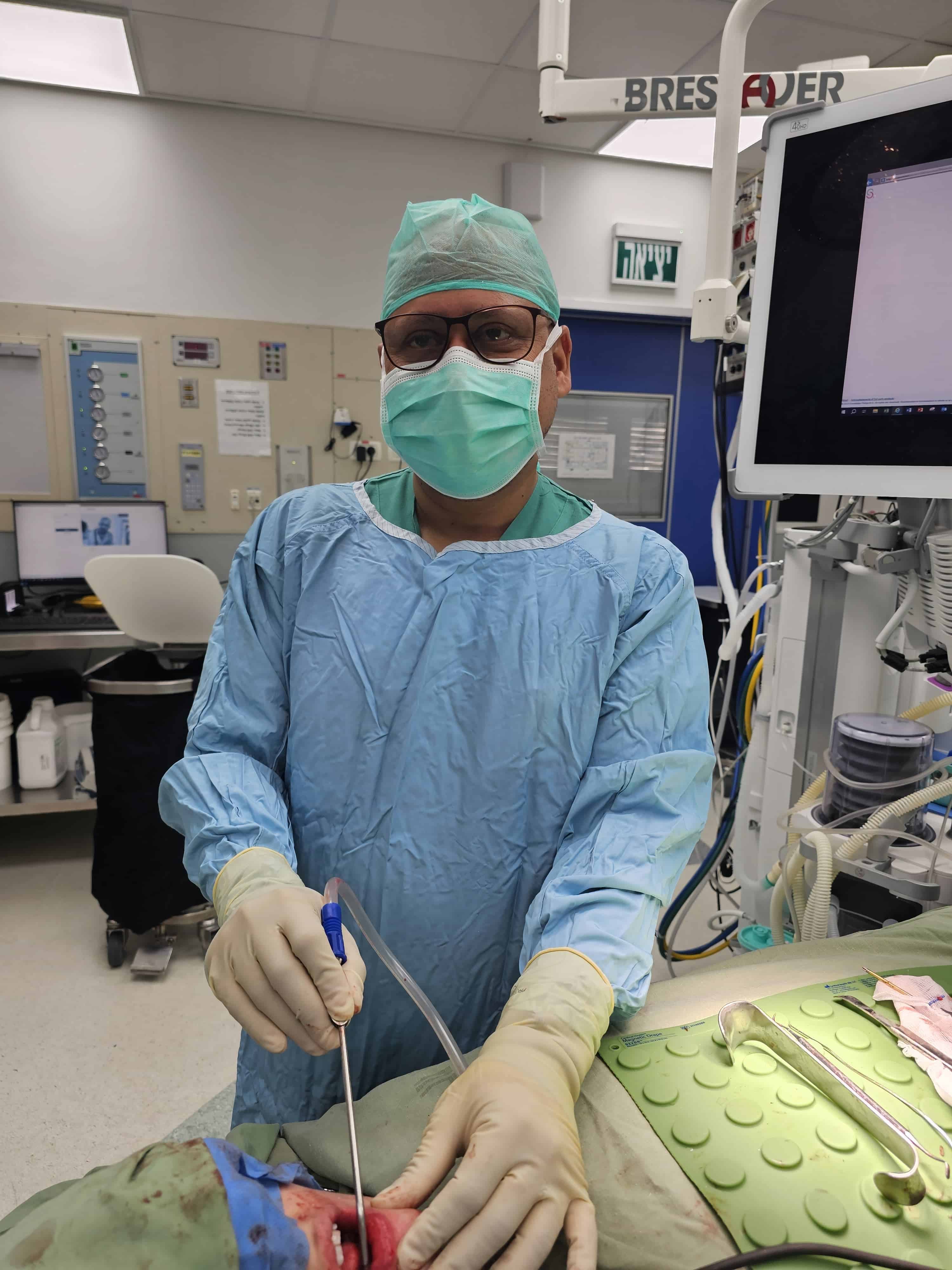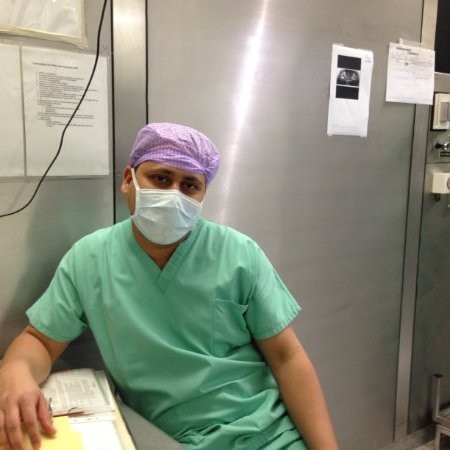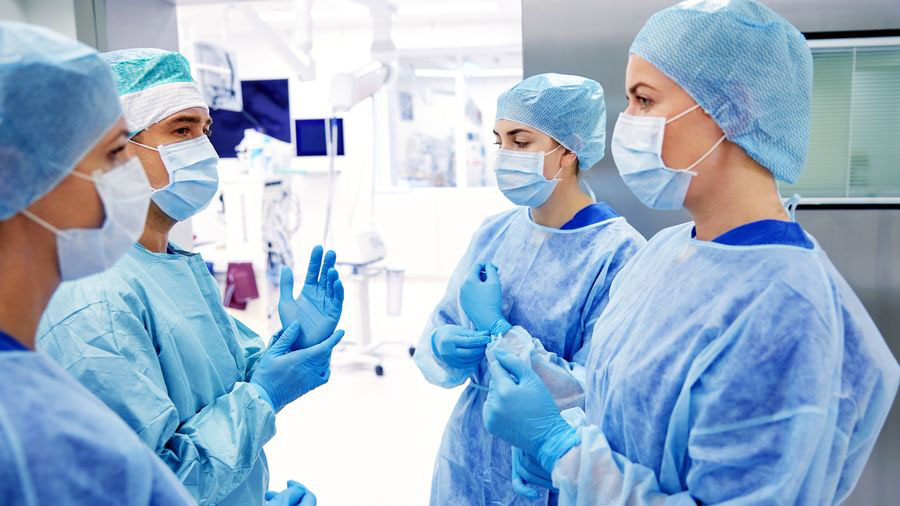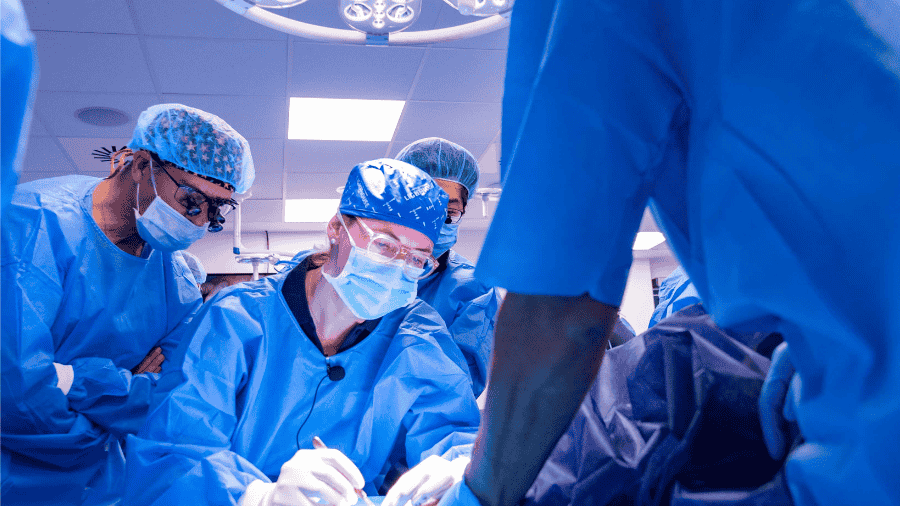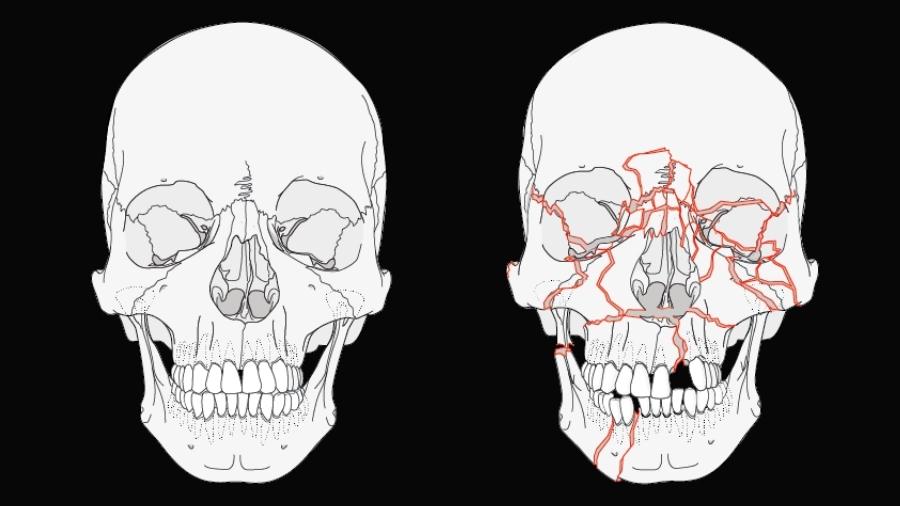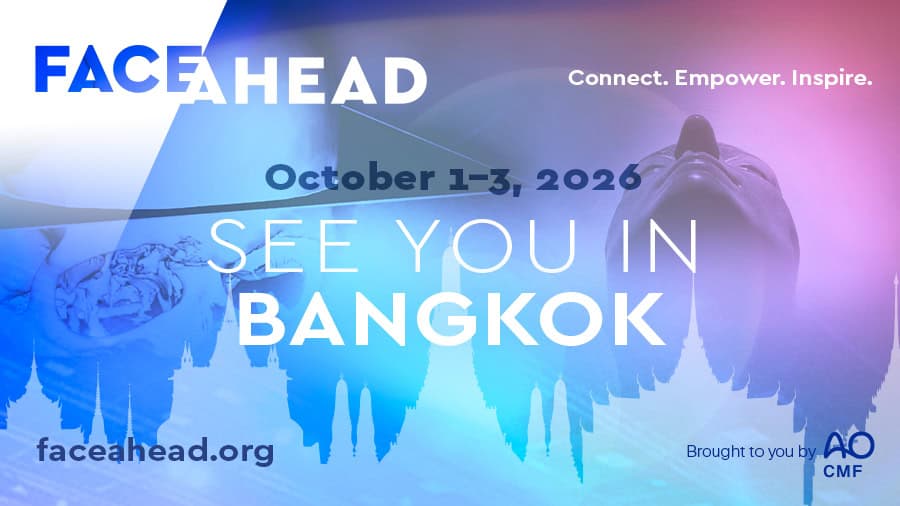Why pursue an AO CMF Fellowship? A journey from Jumla to Tel Aviv
BY DR PRENIT KUMAR POKHAREL, AO CMF FELLOW
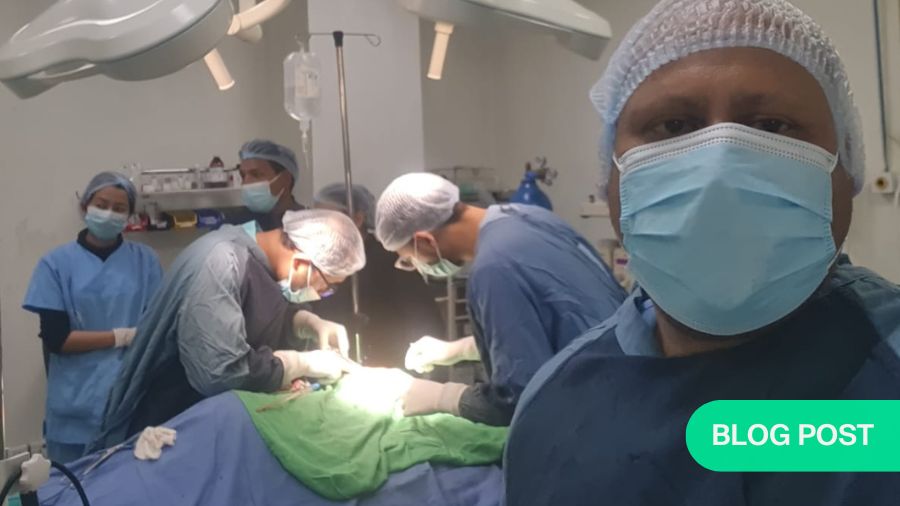
For cranio-maxillofacial (CMF) surgeons, particularly those practicing in resource-limited settings, the opportunity to engage in an international fellowship can be transformative. The AO CMF Fellowship program opens a unique window into advanced surgical care, fostering not only clinical excellence but also professional growth and global collaboration.
-
Read the quick summary:
- A Nepalese CMF surgeon Dr Prenit Kumar Pokharel shares insights from an AO CMF Fellowship at Sheba Medical Center, highlighting its impact on global learning and practice.
- Fellowships enhance surgical skills, expose fellows to cutting-edge tech, and foster teamwork, ethics, and professional growth.
- Surgeons can apply new techniques, build global networks, and lead improvements in care back home through shared learning.
- What’s next: inspiring others, adapting innovations locally, and discussing how to scale access to such transformative fellowships.
Disclaimer: The article represents the opinion of individual authors exclusively and not necessarily the opinion of AO or its clinical specialties.
As a recent fellow coming from Jumla, a remote and mountainous region of Nepal, I undertook this journey by completing an AO CMF Fellowship at Sheba Medical Center in Tel Aviv, Israel. My experience, while deeply personal, also illustrates broader truths about why fellowships matter, especially in the rapidly evolving field of CMF surgery. This journey not only elevated my surgical expertise but reshaped my vision for patient care and team leadership.
Global learning: why an AO CMF Fellowship matters
An AO CMF Fellowship is not merely a training program—it is a bridge between continents, connecting surgeons to a global network of expertise, technology, and best practices. For surgeons from developing healthcare systems, this exposure can be particularly impactful.
1. Exposure to international standards and practices
Fellows are immersed in a clinical environment where they can observe and participate in surgeries conducted according to international protocols. This includes nuanced approaches to trauma care, reconstructive surgery, and congenital anomalies. The ability to witness how different institutions manage complex CMF cases provides a broader perspective on surgical options, risk management, and patient outcomes.
2. Learning with world-renowned surgeons
Fellows are mentored by leading CMF surgeons with decades of focused expertise. These mentors bring deep insights into surgical planning, operative decision-making, and postoperative care. 4. Through close interaction, fellows gain access to technical pearls and thought processes that are often not accessible through textbooks or virtual learning alone.
3. Gain insights into advanced technology and multidisciplinary care
AO CMF host centers offer exposure to cutting-edge technology, including computer-assisted surgery, custom implant design, 3D printing, and navigation systems. Fellows get exposure and engage with multidisciplinary teams that include radiologists, anesthesiologists, orthodontists, and oncologists—an integrated approach that highlights the collaborative nature of modern CMF care.
4. Cultural and clinical exchange
Beyond technical skills, fellowships foster an exchange of cultural and clinical philosophies. Surgeons learn how societal norms, healthcare systems, and patient expectations influence surgical choices and ethics. This broadens the fellow’s ability to navigate diverse clinical environments and improves adaptability and communication. For AO CMF fellows, it is also recommended to complete the AO Access module on Unconscious Bias.
A fellow’s advantages: beyond the operative field
While operative experience is central, the benefits of an AO CMF Fellowship extend well beyond the operating room.
1. Expanded surgical repertoire
Fellows gain hands-on or observational experience with a wider range of procedures than may be available in their home countries. My fellowship exposed me to the management of complex mid-facial trauma, temporomandibular joint (TMJ) management in staged protocols, oncologic reconstruction using microvascular flaps, and gender affirmation surgery, a procedure rarely performed in my region.
2. Technological integration
Daily exposure to sophisticated diagnostic and planning tools enhances a surgeon’s ability to approach cases with precision. Imaging modalities, intraoperative navigation, and software for 3D modeling allow for more predictable outcomes and efficient workflows. Learning how to apply these tools can inform scalable adaptations in lower-resource settings.
3. Professional and ethical development
Equally important were the values instilled by the team and what the fellowship environment encourages: values such as teamwork, clear communication, compassionate care, communication, and ethical decision-making. These soft skills are essential for leadership and for cultivating a positive workplace culture in any setting.
The supportive and inclusive environment made it easy to exchange knowledge and foster long-lasting professional relationships. Fellows become part of a professional culture where mutual respect and patient-centered care are paramount.
4. Lifelong connections
Fellows often establish long-term professional relationships with mentors and peers, creating a network that supports knowledge exchange, future collaborations, and continued learning.
Being part of the global AO CMF community provides ongoing access to educational resources, case discussions, and research opportunities.
Overcoming challenges: from the Himalayas to the Middle East
International fellowships are not without their challenges. The contrast was significant, moving from the hills of Jumla to Tel Aviv, one of the most expensive cities in the world. Cultural adaptation, financial considerations, and the logistics of living in a new country can be significant.
1. Cultural and linguistic barriers
Moving from the rural highlands of Nepal to a bustling urban center like Tel Aviv involves major cultural shifts. Language differences may present obstacles in day-to-day life, even if the medical team communicates in English. Understanding local customs, dietary differences, and social expectations requires an open mind and willingness to adapt. For AO CMF fellows, it is recommended to complete the AO Access module on Unconscious Bias.
2. Financial planning
The cost of living in major international cities can be daunting, especially for fellows from low-income regions. Planning and budgeting are essential.
Some fellowships offer stipends or housing support, but even so, fellows must prepare for the realities of relocation and temporary life abroad.
3. Emotional and mental resilience
Leaving behind family, familiar routines, and one’s professional comfort zone can be emotionally taxing. However, these challenges also foster personal growth. Fellows often return home with heightened resilience, empathy, and the confidence to face complex situations both in and outside of the operating room.
Career impact: a broader horizon
The professional benefits of an AO CMF Fellowship are far-reaching and often long-lasting. Here are some key professional advantages I consider adding value to Fellowships:
1. Technical and clinical advancement
Exposure to new surgical techniques and protocols enriches a surgeon’s skill set. Techniques such as TMJ management using staged protocols, or jaw reconstruction with custom implants, can be adapted for use in a variety of clinical settings, even with limited resources.
2. Leadership and mentorship
Having trained in a high-functioning clinical team, many fellows return home better equipped to lead their departments, to mentor junior colleagues, and to contribute to institutional development. The emphasis on teamwork, documentation, and evidence-based practice raises the overall standard of care, and it gave me confidence to mentor younger surgeons and elevate care standards back home.
3. Advocacy for innovation and access
Fellows often become agents of change in their own health systems. They may introduce telemedicine for follow-up care, advocate for team-based care and ethics with multidisciplinary treatment models, and encourage local production of surgical guides and implants. The fellowship empowers surgeons to think creatively about extending care in resource-constrained environments.
4. Academic and research engagement
An international fellowship can also inspire or facilitate involvement in academic work. Many fellows go on to present at conferences, contribute to publications, or initiate collaborative research projects to amplify their impact beyond the clinic.
Bringing it back: fellowship as a catalyst for local change
For surgeons returning to their home countries, the real test of a fellowship’s value lies in its application to local practice. Returning to Nepal, I bring not just surgical knowledge but a transformed outlook. I plan to use my new knowledge to
- Implement structured TMJ protocols tailored to regional needs.
- Establish interdisciplinary care pathways involving dental surgeons, radiologists, and physiotherapists.
- Raise awareness of patient dignity, gender inclusivity, and ethical practices.
Encourage younger surgeons to seek out global opportunities and broaden their horizons, to inspire them to look beyond boundaries and dream big!
Moreover, returning fellows often assume the role of change agents within their institutions. They may contribute to the development of surgical training programs, participate in policy discussions, or introduce quality assurance initiatives that align with global standards.
Conclusion: why fellowships matter
An AO CMF Fellowship offers more than surgical training; it provides a lens into the future of global surgery. For surgeons in developing countries, it can be a pivotal experience that shapes careers and improves patient care systems. The opportunity to train alongside world leaders in CMF surgery, to observe high-resource settings firsthand, and to bring those insights back home is invaluable.
The fellowship is not an end, but a beginning, or a launchpad for innovation, leadership, and lasting professional relationships. It is an invitation to think globally while acting locally, with compassion, precision, and purpose.
Acknowledgments
The success of any fellowship is built on support, both institutional and personal. I am deeply grateful to AO CMF, my mentors at Sheba Medical Center, and my home institution in Nepal for supporting this incredible journey. To future fellows: embrace the challenges, stay curious, and let the experience transform you.
About the author:
Dr Prenit Kumar Pokharel completed his BDS from BPKIHS in 2005, and received his MDS from Manipal College of Dental Sciences from Mangalore. India. He later visited the TMK Department in Rigs Hospitalet, Copenhagen, where he enjoyed an excellent opportunity to learn more. Dr Pokharel also stayed in the Department of Craniofacial Surgery at St AZ Hospital, in Brugge, Belgium, worked a long periodin Kantipur Dental College in Kathmandu, Nepal, followed by a year in the Nepal Medical college.
Dr Pokharel enjoys teaching and sharing his knowledge. He is currently working in the midwestern part of Nepal, geographically located far from a city, and says he loves working in remote parts of the country.
You might also be interested in:
AO CMF Fellowship Program
The program offers a unique educational experience to the most promising young surgeons in the entire field of craniomaxillofacial surgery.
AO CMF Courses and Events
Explore the upcoming courses, webinars, or online events in your region and worldwide. You can download a list of all upcoming events in your region in PDF format.
CTRead—Facial Bones Anatomy Training
Learn to interpret facial bone computed tomography correctly. This free online course instructs residents in a logical, stepwise manner to locate and identify facial fractures.
Join AO CMF's bi-annual congress
Face Ahead is the event where the top names in the CMF field reveal their best kept secrets and give hands-on advice to the next generation of surgeons.

